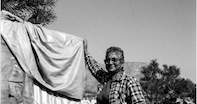Phyllis Naidoo was a was a lawyer, university lecturer, author, activist and a force to be reckoned with. She was a member of the Non-European Unity Movement, Natal Indian Congress, the South African Communist Party and uMkhonto we Sizwe. Although Naidoo passed away in 2013, she will be remembered for her outstanding participation in the liberation movement, as well as her immense contributions to South African society.

Prayer and Politics
Phyllis Naidoo was born in KwaZulu-Natal in 1928 and grew up in a religious household. During her high school years, Naidoo developed a strong sense of community, wanting to help those affected by life-threatening diseases such as Tuberculosis (TB). She went to work at the Friends of the Sick Association after she completed high school. She then went on to train as a TB nurse.
As Naidoo was surrounded by constant suffering and pain, she felt the need to help more in her community. Naidoo eventually chose politics over religion and got involved in the liberation movement in the late 1940’s. She joined NEUM (Non-European Unity Movement) and went on to create a Human Rights Committee at the Natal University (The University of KwaZulu-Natal), where she attended night-classes, to raise money for people who were on trial for various apartheid crimes or activism, who had families to look after.
Later Phyllis joined the Natal Indian Congress (NIC), where she wrote speeches for her fellow comrades. In 1958, she began working with her husband, MD Naidoo and Govan Mbeki in aiding activists working underground against the oppressive regime, helping people leave the country. In 1961, Phyllis Naidoo joined the South African Communist Party (SACP), where she challenged the Bantu Education Act.
After the banning of political parties and organisations in 1961, Naidoo became affiliated with uMkhonto we Sizwe (MK). Naidoo endured many hardships, including her banning in 1966 and her husband’s prison sentence to Robben Island a year later. She remained banned until 1976. She spent many years aiding those working underground.
While she was under house arrest, Naidoo began to study law and obtained her degree in 1973. She started practicing in 1976, but organised to go into exile with other ex-political prisoners to Lesotho in 1977. While in Lesotho, Naidoo joined the African National Congress (ANC) and continued her welfare work by assisting SACP and ANC members to escape from South Africa, and supporting children who had left South Africa.
In 1990, Naidoo returned to South Africa from exile and continued her spirited fight for the liberation movement. In 2003, the Order Of Luthuli In Silver was conferred on Naidoo for her outstanding contribution to Human Rights and the struggle for liberation in South Africa.